Meet the Candidates
Eleven candidates have been nominated for the position of Ordinary Member Elect. Below you will find details about the candidates and a link to their candidate statement. This information has been provided by the candidates to assist members while deciding how to cast their vote.
You must be an IEPA member to vote. The Voting Deadline is July 14, 2018.
Voting for Ordinary Member Elect has Closed.
Paul French
Paul French is an Honorary Professor at Liverpool University and Clinical Lead for Early Intervention in Psychosis services in Manchester and Cheshire, UK.
I would like to be considered for a board position within the IEPA and feel that my extensive and broad experience in the field would make me an ideal candidate.
I have been involved with the development of research and evaluation in early intervention in psychosis for a number of years. This has included extensive research in the area of emerging psychosis and At Risk Mental States and the development of treatment strategies to support these individuals and more latterly family based interventions. More recently I have been involved with studies targeting social disability in a trans-diagnostic approach with the aim of developing specific interventions to minimise this.
I have supported the development of clinical services, locally, regionally and nationally across England for a number of years and was central to the Expert Reference Group that established the Access and Waiting Times Standard for EIP. I continue to provide clinical leadership nationally in this area in order to support the uptake of these standards. I have recently been appointed as joint National Clinical Advisor within the Royal College of Psychiatry with regard to the EIP National Clinical Audit of Psychosis. Furthermore, I have excellent international links and collaborations.
I would welcome the opportunity to help promote the vital work of the IEPA, supporting existing members whilst looking for opportunities to develop and expand the membership.
As an added bonus I feel that as a mental health nurse I would bring a wider and more diverse multidisciplinary perspective to the board which to date has been predominantly made up of Psychiatry and Psychology colleagues.
I believe that my experience to date across research, policy and clinical services provide me with an excellent skill set to work at board level within the IEPA and would welcome the opportunity to be considered for this post.

Kate Hardy
Kate Hardy is Clinical Associate Professor, Psychiatry and Behavioral Sciences at Stanford University.
Serving as a Regular Member on the IEPA board would be a great honor. I have considered IEPA my home organization since joining in 2002. The organization provided a context for the global significance of a paradigm shift that prioritized intervening early in the course of mental health problems and closely aligned with my personal and professional values. Subsequently, I have been dedicated to furthering the field specifically with respect to dissemination and implementation in diverse settings with a focus on improving access to evidence-based interventions.
I am passionate about global dissemination and consideration of cultural and organizational barriers and supports. I have experienced two disparate healthcare settings (United Kingdom and United States) engage in national implementation in early intervention. I look forward to bringing this experience to discussions regarding local, national, and international best practice. I am a founding member of PEPPNET, a national network of early psychosis programs in the United States. I also serve as co-organizer of the upcoming pre-conference meeting ahead of IEPA 11 in Boston. This meeting was conceptualized to engage US-based community providers in national discourse around cutting-edge research, not typically accessible outside an academic setting. These activities exemplify my commitment to bridging the gap between academia and clinical implementation. I would utilize this experience on the board to promote outreach and development in countries without an established early psychosis implementation model and would seek to enhance opportunities to further engage individuals with lived experience in the development of IEPA.
Throughout my work across two continents, IEPA has provided a backdrop of support to the advancement of the field. I am eager to provide service to an organization that has offered so much. I am deeply committed to the mission of IEPA and would be honored to support the continued growth of this organization.

Nev Jones
Nev Jones is Assistant Professor of Mental Health Law and Policy at the University of South Florida.
I am a community psychologist by training, and currently an assistant professor of mental health law and policy at the University of South Florida, affiliate faculty of the Louis de la Parte Florida Mental Health Institute and (affiliate) clinical assistant professor of psychiatry at Yale University. In addition, I serve as a consultant-trainer for OnTrackNY/USA. A former recipient of specialized early psychosis services, I have been involved with early intervention research, policy and programming in the US since beginning my graduate studies, and an IEPA member since 2014. Current early psychosis research projects focus on patient outcomes following discharge from specialty EIP services, interventions designed to strengthen program capacity to successfully engage clients and families with histories of trauma and socioeconomic disadvantage, and programmatic work in the area of supported education. Broader funded research in youth/young adult mental health zeroes in on the role of emergency and crisis services in pathways to and through care across diagnostic groups.
As a service user and family member, I am deeply committed to finding ways to support greater collaboration between young people, carers, providers and researchers. As an IEPA ordinary member, I would aspire to increase the involvement of service users and carers in IEPA activities, and continue to support IEPA’s already strong commitment to holistic recovery and transformative systems change.
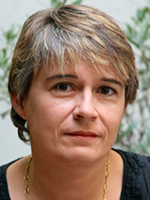
Marie-Odile Krebs
Marie-Odile Krebs is Professor In Psychiatry at University Paris Descartes.
As Professor In Psychiatry at University Paris Descartes, I head of the “Service Hospitalo Universitaire”, in Sainte-Anne hospital, Paris as well as a research team in the Center for Psychiatry and Neurosciences (UMR 894 Inserm, University Paris Descartes). We develop interdisciplinary researches in the onset of psychosis, which aim to understanding the interactions of the early genetic and developmental vulnerability with post-natal brain maturation and environmental factors (stress, cannabis) using various approaches (genetic, neuroimaging, deep phenotyping and animal models). We identified for the first time dynamic epigenetic changes associated with psychosis onset (Kebir et al, 2017, Chaumette et al, 2018). In the clinics, we developed the first outpatient clinic for specialized care for early psychosis in adolescent and young adults in France in 2003 (Oppetit et al, 2018). I am deeply engaged to promote early intervention in psychosis in my country and in French speaking country and to develop a tool box to provide emerging centers with state-of-art assessment tools and therapeutic programs (for psychoeducation, cognitive remediation etc) as well as specialized formation. Since 2006, I have launched a national initiative to promote early intervention in France ‘Reseau Transition’, hosted by the national collaborative consortium (www.institutdepsychiatrie.org, GDR3557). Our mission is to promote formation (Master Class, Universitary Diploma) and information, destigmatization actions and clinical research to improve care in early psychosis, including medico economic studies.
I joined the IEPA in 2006, and the interactions with the IEPA members strongly inspired my clinical practice and research projects. I now wish to candidate for joining the board as an ordinary member to further engage at an international level and share experiences to further pave the way for psychosis prevention.
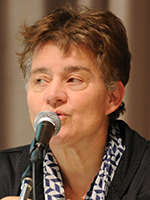
Merete Nordentoft
Merete Nordentoft is Professor in Psychiatry at the University of Copenhagen.
I am Professor in Psychiatry; University of Copenhagen and I have been a member of IEPA since 1998. I think IEPA is one of the most important and successful international associations in mental health. IEPA has improved the lives for many young people in early phases of psychoses, and it has had a tremendous impact on how services for young people are organized all over the world. It has changed the image of psychiatry to be more user friendly and less stigmatizing. We have a strong scientific background for our work, and we should continue to promote science and increase the evidence base in order to improve the lives for young people with mental health problems and their families.
I have played a leading role in developing and implementing early intervention services in Denmark. My areas of expertise are epidemiology, suicidal behavior, psychopathology and early intervention in psychosis. I led the process from research to implementation of early intervention services all over Denmark. I have worked with suicide prevention at a national level since 1997 and together with a group of epidemiologists from Nordic countries, I have demonstrated that life expectancy for people with schizophrenia is 15 to 20 years shorter than in the general population. In 2012 I initiated the Danish High Risk and Resilience Study VIA 7 -a representative cohort study of 522 7-year-old children with 0, 1, or 2 parents with schizophrenia or bipolar disorder, which will be followed into adulthood. I have received the Golden Scalpel Award, Global Excellence in Health, the Richard Wyatt Award and the Marie, August Krogh Award, and the honorific award from Danish Medical Association. In 2017, I was identified as one of the one percent most cited researchers in the period 2005-2015.
I have served as president of IEPA from 2012 to 2014, and I will like to continue to be involved in the association. In collaboration with the rest of the board, I will focus on implementation of early intervention services for young people with psychotic disorders, services for people with milder disturbances of thought and perception (UHR) and also services for people with other mental disorders.
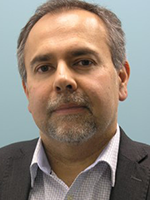
Ian Soosay
Ian Soosay is Deputy Director and Principal Advisor Mental Health at Ministry of Health, New Zealand.
I am a passionate supporter of early intervention in mental health since my introduction to an Early Psychosis Teams in London in 2007. A psychiatrist by training, I have made New Zealand my home for over a decade and I am currently the Deputy Director of Mental Health at the Ministry of Health. I am always interested in ways of improving access and developing service models that will support young people first presenting with mental illness. I have been a past chair of the New Zealand Early Intervention in Psychosis Society and was part of the team that developed Talking Minds (www.talkingminds.co.nz), an online resource for young New Zealanders presenting with psychosis. I retain an academic interest in the area through my appointment as on Honorary Senior Lecturer at the University of Auckland, and I am currently involved in research in areas including the prediction of treatment response in psychosis and technological innovations to improve the detection and treatment of mental illness in pregnancy.
I will bring a wealth of experience to the Board. In my current role, I have significant input into the development of policy and strategic thinking at a national level in New Zealand, a country which is often seen as an innovator in mental health and that is currently in the midst of a Mental Health Inquiry to rethink our approach to mental health and wellbeing. Additionally, I have good networks in the Asia Pacific region, having previously worked in Australia, Indonesia and East Timor, as well currently working in a number of Pacific Island nations.

Michio Suzuki
Michio Suzuki is Professor of Psychiatry at University of Toyama, Japan.
I have long been working on treating mentally ill patients as a psychiatrist. I have had consistent interest in early detection and early intervention for psychiatric disorders. Since I was admitted to membership in the IEPA in 2008, I have been an active member. I worked as a member of the Organising Committee for the IEPA2014 Tokyo and am currently a member of the Scientific Committee of the IEPA2018 Boston. In research, I have been involved in biological studies in psychotic disorders, a main focus of which is elucidating structural and functional brain alterations underlying psychosis development.
Early intervention for psychiatric disorders has been establishing an important paradigm shift in world psychiatry. A big wave of early intervention has already reached Asia. It has produced remarkable progress in research and mental health reform in several Asian countries including Hong-Kong, Singapore, Korea, Japan, etc. As specifically to Japan, however, the number of psychiatric professionals working in this field is relatively small and implementations of the early intervention service are limited.
As an IEPA board member, I would like to widen my experience through the academic activities with getting cutting-edge knowledge of this field and make use of it not only for further development of the association but for international mental health promotion especially in Asia including Japan.
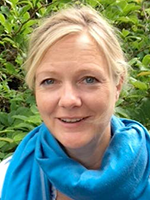
Wench ten Velden Hegelstad
Wench ten Velden Hegelstad is Principal Investigator in the Scandinavian TIPS study.
My name is Wenche ten Velden Hegelstad an I work as consultant clinical psychologist in early detection and early intervention. I started my career in the Netherlands, where I was born, and moved to Stavanger, Norway, in 2000. The reason why I studied clinical psychology was an early interest in psychotic symptoms; I remember as a young student I wondered how it was possible to experience the world so differently from ”everybody else”. Currently , I lead the School- and JobPrescription Team and I am a principal investigator in the Scandinavian TIPS (The early Treatment and Intervention in Psychosis)-study. After 20 years in this field my concern is has shifted more and more towards the social injustice and marginalisation that both predispose for, but also come with, severe mental health problems. There are social inequalities both within a western, wealthy society as the one I live in, but also between countries and continents, that need continuously to be addressed in order to obtain better health and better quality of life for all.
Our interventions, TIPS and School- and JobPrescription, work toward preventing adverse outcomes and alienation from the social arenas (school, work, relationships) that people need to lead meaningful lives. We are part of iFevr, within the IEPA framework, and also of a network with members from Europe, North America, Australia, and South America. We would like to have groups from Asia and Africa join as well, so that all continents can profit from the experiences shared in an international collaborative network.
Cross-continent involvement in pre-empting adverse outcomes and social marginalisation in mental health; meaningful collaboration between clinicians, researchers, people with lived experience of mental health problems, carers and policymakers; and early, no-threshold mental health strategies and innovative treatments based on high quality research are themes close to my heart. If IEPA would grant me the opportunity to help work towards these ends through board membership I would be most honoured.
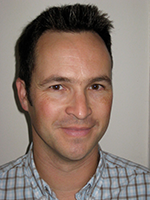
Andrew Thompson
Andrew Thompson is Associate Clinical Professor in Psychiatry at Warwick Medical School, UK.
I have worked as a psychiatrist in early intervention in psychosis since 2004, initially as a clinician and latterly as a clinical academic. My academic interest is both in risk factors for developing psychosis as well as novel interventions to treat early psychosis including using technology such as virtual reality. I have worked in a number of clinical teams internationally including 3 teams in different areas of the UK and in EPPIC in Australia. I was also clinical director of the PACE at risk for psychosis clinic in Melbourne between 2007 and 2011. This has given me a greater understanding of how services can be delivered and the need for political and public advocacy to improve understanding of early treatment of psychotic disorders. I have latterly been involved in the development of youth mental health services in the UK based on the early intervention in psychosis model. I am due to take up a position at Orygen Youth Health that will help develop early psychosis service models in a number of sites Australia wide. As a clinical academic I feel I am ideally placed to understand the clinical demands of services and service pressures as well the need for evidence based practice and innovation. I believe that the ongoing international expansion of early intervention will provide opportunities and am interested in how this approach can be implemented in low/middle income countries as well as how early intervention paradigms can be applied to other disorders. I hope to bring these varied skills and experience to the board of the IEPA.

Phil Tibbo
Phil Tibbo is the Director of the Nova Scotia Early Psychosis Program in coastal Halifax, Nova Scotia.
It is an honor to be nominated for the position of “Regular Member” on the IEPA Board. I have been involved with early intervention services for psychosis in both clinical and research roles for almost 15 years. I have been the Clinical Director for the Edmonton Early Psychosis Intervention Clinic (EEPIC) in Alberta Canada and for the last 10 years the Director of the Nova Scotia Early Psychosis Program in coastal Halifax, Nova Scotia. I have been a past board member and currently the President of the Canadian Consortium for Early Intervention in Psychosis (CCEIP; epicanada.org), the national clinical organization of early intervention programs in Canada. CCEIP’s mandate is to enhance optimum care for Canadians in the early phase of psychosis through improved service models and the generation and translation of knowledge. Our most recent foci has been in the areas of: LAI and clozapine use in EPP, specific rating scale development, implementation of standardized order sets, and cannabis knowledge translation for patients and clinicians.
I am currently Professor and Dr. Paul Janssen Chair in Psychotic Disorders at Dalhousie University in Halifax Nova Scotia Canada with a cross-appointment in Psychology. My areas of research include application of in vivo brain neuroimaging techniques to study psychosis as well as research interests in co-morbidities in schizophrenia, addictions (primarily cannabis) and psychosis, pathways to care, service delivery, education, and non-pharmacological treatment options.
As a member of the IEPA Board I would be in a position to ensure optimal communication between Canadian EPI programs and the IEPA organization thru CCEIP, bring my leadership and background of biologic and service delivery research, as well as my expertise in knowledge translation to this role. I feel with my experience I can play a role in the organization as it readies itself for the future changes in our field.
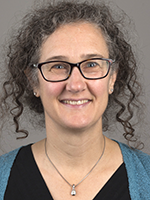
Kristen Woodberry
Kristen Woodberry is Assistant Professor of Psychology at Harvard Medical School and Director of the Program for Psychosocial Protective Mechanisms at Beth Israel Deaconess Medical Center, Massachusetts, USA.
It is a great honor to be nominated for a position on the IEPA board. Having worked for over 25 years as a clinical social worker and psychologist and in a range of United States child and adult psychiatry and psychosis research settings, I would bring to this role an appreciation for the unique challenges of early intervention programs in the United States, and welcome input and requests from colleagues in Canada, and Mexico.
Although the sudden loss of my longtime mentor Larry Seidman has hit our field hard, I am committed to carrying forward his spirit of international collaboration. It has been an honor to step in as co-convenor of the 2018 IEPA conference, “Broadening the Scope” in Boston Massachusetts and to gain a hands-on appreciation for the expanding role of IEPA. We are looking forward to increased participation by North American clinicians and researchers. Increased focus on early psychosis and early intervention/prevention programming at the national level in the United States offers a “critical period” for the development of new collaborations, longitudinal studies, treatment implementation, component and cost effectiveness analyses, and public education. I am eager to leverage the resources of the IEPA community to catalyze mental health system reform. Making prevention and early intervention services sustainable, particularly in North America, is essential to this.
Finally, my recent research has focused on the use of technology to engage adolescents and young adults and to better understand heterogeneity in developmental trajectories. If elected, I am interested in seeking ways to better integrate developmental psychopathology and innovative technologies into early intervention science and practice. I would work to recruit more developmental scientists, child and adolescent clinicians, and technology experts into the IEPA community.